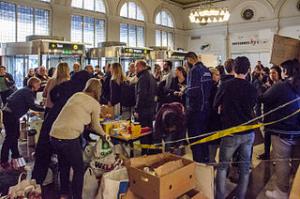Refugee crisisDanish parliament to approve seizure of valuables from asylum seekers
The Danish parliament appears ready to approve today (Wednesday) a controversial measure proposed by Denmark’s government, which would allow the Danish authorities to confiscate jewelry and cash from asylum seekers. Lars Løkke Rasmussen, Denmark’s prime minister, strongly defended the law stripping refugees of valuables, saying that many of those coming to Denmark have no idea how generous the Danish welfare state is. “It is in that context you should understand that we in Denmark say before you get these benefits, you must — if you have a fortune — pay for yourself,” the prime minister said.

Unlike Sweden, Denmark places restrictions on refugees // Source: commons.wikimedia.org
The Danish parliament appears ready to approve today (Wednesday) a controversial measure proposed by Denmark’s government, which would allow the Danish authorities to confiscate jewelry and cash from asylum seekers.
Critics described the measure as xenophobic. The initial version of the law called for stripping asylum seekers of any valuables, except for items of “special personal significance” under a “sufficient value.” In order to gain cross-party support, the government last week amended the proposed bill, adding wedding rings and other items of sentimental value to the list of exception – but only if these sentimental items were worth no more than DKr10,000 ($1,453).
The Financial Times reports that five small and mid-size Danish political parties harshly criticized the amended measure, and the government was not sure it would have a majority in Wednesday vote unless lawmakers of one or two of these parties agreed to support the measure. The government, therefore, amended the bill further, so it now allows for seekers to keep all sentimental items such as family portraits and wedding and engagement rings. They will also be able to keep up to DKr10,000 in cash, up from DKr3,000.
The UN Refugee Agency joined in the criticism of the measure, saying: “The signal Denmark’s introduction of restrictions sends to other countries in the world . . . is worrisome and could fuel fear, xenophobia and similar restrictions that would reduce — rather than expand — the asylum space globally.”
Denmark has been steadily tightening its refugee policies, in no small measure as a result of the fact that the current government owes its parliamentary majority to the anti-immigration Danish People’s party, which has proposed, among other things, that the Danish government take out adverts in Middle Eastern newspapers warning against coming to Denmark.
Lars Løkke Rasmussen, Denmark’s prime minister, caused a firestorm at Christmas when he said the 1951 Refugee Convention might need revising. “If this [influx of migrants] continues or gets worse . . . we will get to the point where we’ll have to talk —and Denmark won’t be able to do it alone —about changing the rules of the game,”he told Danish television.
Rasmussen strongly defended the law stripping refugees of valuables, saying that many of those coming to Denmark have no idea how generous the Danish welfare state is. “It is in that context you should understand that we in Denmark say before you get these benefits, you must — if you have a fortune — pay for yourself,” the prime minister said.
Last week – for the first time since 1954 — Sweden introduced identity checks for passengers arriving on trains and boats from Denmark. Fearing that many refugees heading for Sweden would now be left stranded in Denmark, Denmark has responded by introducing spot checks on its border with Germany.
Denmark has accepted only about 20,000 asylum seekers in 2015 – 2 percent of the total to arrive in Europe last year.
